Psy 402 topic 2 dq 2 - Study guides, Class notes & Summaries
Looking for the best study guides, study notes and summaries about Psy 402 topic 2 dq 2? On this page you'll find 146 study documents about Psy 402 topic 2 dq 2.
All 146 results
Sort by
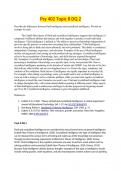
-
PSY 402 TOPIC 1 DISCUSION QUESTIONS 1 TO TOPIC 8 DISCUSION QUESTIONS 2| VERRIFIED QUESTIONS AND ANSWERS| 100% 2023/2024 UPDATE
- Package deal • 17 items • 2024
-
- $35.49
- + learn more
PSY-402 Topic 1 DQ1 PSY-402 Topic 1 DQ2 PSY-402 Topic 2 DQ1 PSY-402 Topic 2 DQ 2 PSY-402 Topic 3 DQ 1 PSY-402 Topic 3 DQ 2 PSY-402 Topic 4 DQ 1 PSY-402 Topic 4 DQ 2 Psy 402 Topic 5 DQ 1 Psy 402 Topic 5 DQ 2 Psy 402 Topic 6 DQ 1 Psy 402 Topic 6 DQ 2 Psy 402 Topic 7 DQ 1 Psy 402 Topic 7 DQ 2 Psy 402 Topic 8 DQ 1 Psy 402 Topic 8 DQ 2
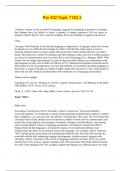
-
Psy 402 Topic 7 DQ 2
- Exam (elaborations) • 3 pages • 2024
-
- $9.99
- + learn more
Psy 402 Topic 7 DQ 2 Chomsky’s theory on the evolution of language suggests that language is generative, meaning that humans have the ability to create a number of unique sequences. Do you agree or disagree with his theory? Give concrete examples from your readings to support your answer. Class, I do agree with Chomsky in the idea that language is degenerative. Language seems to be innate for humans as it is within the first months of a baby’s life that they make noises to receive mat...
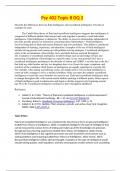
-
Psy 402 Topic 8 DQ 2
- Exam (elaborations) • 2 pages • 2024
-
- $9.99
- + learn more
Psy 402 Topic 8 DQ 2 Describe the differences between fluid intelligence and crystallized intelligence. Provide an example for each. The Cattell-Horn theory of fluid and crystallized intelligence suggests that intelligence is composed of different abilities that interact and work together to produce overall individual intelligence. Fluid intelligence is defined as "the ability to perceive relationships independent of previous specific practice or instruction concerning those relationships....
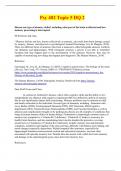
-
Psy 402 Topic 5 DQ 2
- Exam (elaborations) • 2 pages • 2024
-
- $9.99
- + learn more
Psy 402 Topic 5 DQ 2 Discuss one type of memory deficit, including what part of the brain is affected and how memory processing is interrupted. Hi Professor and class, “Memory deficits and loss, known collectively as amnesia, can result from brain damage caused by surgery, disease, and physical or psychological trauma”(Gazzaniga, Ivry & Mangun, 2018). There are different forms of amnesia. One form is amnesia is called retrograde amnesia. It affects one thalamus and hippocampus. With...
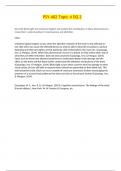
-
PSY-402 Topic 4 DQ 2
- Exam (elaborations) • 1 pages • 2024
-
- $7.99
- + learn more
PSY-402 Topic 4 DQ 2 Describe blind sight and unilateral neglect and explain the contribution of these phenomena to researchers’ understanding of consciousness and attention. Class, Unilateral spatial neglect occurs when the attention network of the brain is only affected on one side which can cause the affected person to only be able to describe or produce a picture depicting only their perception of that particular side of themselves, the room etc. (Gazzaniga, Ivry, & Mangun, 2014)...
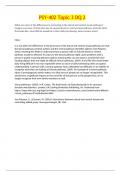
-
PSY-402 Topic 3 DQ 2
- Exam (elaborations) • 1 pages • 2024
-
- $7.99
- + learn more
PSY-402 Topic 3 DQ 2 What are some of the differences in processing in the dorsal and ventral visual pathways? Imagine you have a friend who has an injured dorsal or ventral visual pathway, describe what that looks like, what deficits would be in their daily functioning, what remains intact. Class, In a nut shell, the differences in the processes of the dorsal and ventral visual pathways are that the dorsal pathway controls actions and the ventral pathway identifies objects (Van Polanen...
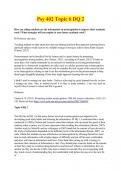
-
Psy 402 Topic 6 DQ 2
- Case • 3 pages • 2024
-
Available in package deal
-
- $10.09
- + learn more
Psy 402 Topic 6 DQ 2 How can college students use the information on metacognition to improve their academic work? What strategies will you employ in your future academic work? Hi Professor and class, Teaching students to think about how they are thinking and how they approach learning about a particular subject would seem to be a helpful strategy in trying to achieve these kinds of goals (Tanner, 2012). Preassessment can be beneficial for the learner and is a great chance for promotin...
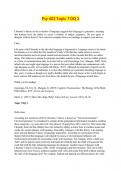
-
Psy 402 Topic 7 DQ 2
- Case • 3 pages • 2024
-
Available in package deal
-
- $10.09
- + learn more
Psy 402 Topic 7 DQ 2 Chomsky’s theory on the evolution of language suggests that language is generative, meaning that humans have the ability to create a number of unique sequences. Do you agree or disagree with his theory? Give concrete examples from your readings to support your answer. Class, I do agree with Chomsky in the idea that language is degenerative. Language seems to be innate for humans as it is within the first months of a baby’s life that they make noises to receive mat...
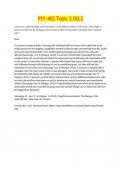
-
PSY-402 Topic 2 DQ 2
- Exam (elaborations) • 1 pages • 2024
-
Available in package deal
-
- $9.99
- + learn more
PSY-402 Topic 2 DQ 2 Given your understanding of the functions of the different lobes of the brain, how might a person be affected by damage to the temporal lobe? Frontal lobe? Occipital lobe? Parietal lobe? Class, If a person’s temporal lobe is damaged the individual will have issues with audial and visual things because of the linguistic capabilities needed to discern logic and meaning from the audial and visual input (Frontal lobe, n.d.). Multi-modal processing areas of the brain are...

-
Psy 402 Topic 8 DQ 2
- Case • 2 pages • 2024
-
Available in package deal
-
- $9.99
- + learn more
Psy 402 Topic 8 DQ 2 Describe the differences between fluid intelligence and crystallized intelligence. Provide an example for each. The Cattell-Horn theory of fluid and crystallized intelligence suggests that intelligence is composed of different abilities that interact and work together to produce overall individual intelligence. Fluid intelligence is defined as "the ability to perceive relationships independent of previous specific practice or instruction concerning those relationships....

That summary you just bought made someone very happy. Also get paid weekly? Sell your study resources on Stuvia! Discover all about earning on Stuvia


